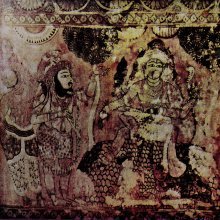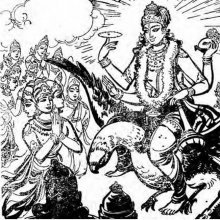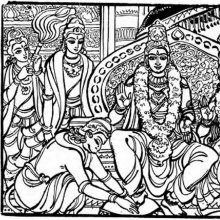Devotion, Devoted: 2 definitions
Introduction:
Devotion means something in Hinduism, Sanskrit. If you want to know the exact meaning, history, etymology or English translation of this term then check out the descriptions on this page. Add your comment or reference to a book if you want to contribute to this summary article.
Images (photo gallery)
(+54 more images available)
In Hinduism
Yoga (school of philosophy)
Source: ORA: Amanaska (king of all yogas): A Critical Edition and Annotated Translation by Jason Birch1) Devotion (to gnosis) is denoted by the Sanskrit term Bhakti, according to the Śivayogadīpikā by Sadāśivayogīśvara: a text dealing with Śaivism and Haṭhayoga in two hundred and eighty-nine verses.—Accordingly, while discussing the difference between Rājayoga and Śaivayoga: “[...] Devotion (bhakti) is gnosis full of Śiva, and Śaiva gnosis is Śiva’s nature. Since Śaiva observance is worship of Śiva, Śiva's yoga is five-fold. He who is without the practice [of worshipping] Śiva is certainly a bound soul, and he goes round and round forever in this cycle of birth and death”.
2) Being Devoted (to a particular practice) is denoted by the Sanskrit term Rata, according to the Amanaska Yoga treatise dealing with meditation, absorption, yogic powers and liberation.—Accordingly, as Īśvara says to Vāmadeva: “[...] Some are devoted (rata) to Mantra Yoga, some are confused by meditation and some tormented by forceful [practices]. They do not know what causes one to cross over [to liberation]. [...]”.

Yoga is originally considered a branch of Hindu philosophy (astika), but both ancient and modern Yoga combine the physical, mental and spiritual. Yoga teaches various physical techniques also known as āsanas (postures), used for various purposes (eg., meditation, contemplation, relaxation).
Shaktism (Shakta philosophy)
Source: ORA: Amanaska (king of all yogas): (shaktism)Devotion (to a particular observance) is denoted by the Sanskrit term Nirata, according to the 17th century Kaulagajamardana (“crushing the Kaula elephant”) authored by Kāśīnātha or Kṛṣṇānandācala.—Accordingly, [as Īśvara said to Pārvatī]: “Listen, O Pārvatī, I shall give a critique of the Pāṣaṇḍas. Knowing this, a wise man is not defeated by them. Those devoted to fake observances (kalpita-ācāra-nirata); those who rebuke the religion of the Vedas; those who have fallen from caste and religious duties; those who have erred and think themselves learned, they are [all] called Pāṣaṇḍas [because] they act contrary to [true] religion. They fall into a terrifying hell until the end of the world. [...]”

Shakta (शाक्त, śākta) or Shaktism (śāktism) represents a tradition of Hinduism where the Goddess (Devi) is revered and worshipped. Shakta literature includes a range of scriptures, including various Agamas and Tantras, although its roots may be traced back to the Vedas.
See also (Relevant definitions)
Full-text (+6402): Bhakti, Bhaktiyoga, Abhakti, Pitribhakti, Nishtha, Nirata, Bhaktihina, Bhartrivrata, Rata, Sadhaka, Pratahsandhya, Dridhabhakti, Kritahaka, Pativrata, Krishnashrita, Ashakti, Bhaktika, Bhaktimat, Bhakta, Saddha.
Relevant text
Search found 411 books and stories containing Devotion, Devoted; (plurals include: Devotions, Devoteds). You can also click to the full overview containing English textual excerpts. Below are direct links for the most relevant articles:
Manusmriti with the Commentary of Medhatithi (by Ganganatha Jha)
Verse 4.94 < [Section XI - Daily Duties]
Verse 2.69 < [Section XVI - General Duties of Twice-born Men]
Verse 6.83 < [Section VII - Means of Removing Sin (kilbiṣa)]
Baudhayana Dharmasutra (by Georg Bühler)
Ramayana of Valmiki (by Hari Prasad Shastri)
Chapter 6 - The city of Ayodhya is decorated for the proclamation < [Book 2 - Ayodhya-kanda]
Chapter 23 - Ramachandra and Lakshmana reach the hermitage of Kama < [Book 1 - Bala-kanda]
Chapter 37 - Marica seeks to persuade Ravana from his Purpose < [Book 3 - Aranya-kanda]
The Vishnu Purana (by Horace Hayman Wilson)
Chapter XII - Dhruva commences a course of religious austerities < [Book I]
Chapter VII - Descriptions of Brahma-yoga < [Book VI]
Models of Devotion: St Francis of Assisi & < [January – March, 1996]
Reviews < [October 1965]
Reviews < [October 1965]
The Garuda Purana (by Manmatha Nath Dutt)
Chapter CCXXXVI - Vishnu Bhakti < [Dhanvantari Samhita]
Chapter CCXXXVII - Vishnu Bhakti (continued) < [Dhanvantari Samhita]
Chapter CCXL - Traits of a true Vaishnava < [Dhanvantari Samhita]
Related products
(+17 more products available)










